Ivory Trade
- Philip1
- Posts: 80
- Joined: Thu Nov 14, 2013 8:00 am
- Country: South Africa
- Location: Western Cape
- Contact:
Re: Elephant Poaching & Ivory Trade
"Lose yourself in Nature and find Peace!" (Ralph Waldo Emerson)
UNITE AGAINST POACHING...What we were given to protect,
do not let poachers take it away!
UNITE AGAINST POACHING...What we were given to protect,
do not let poachers take it away!
- Lisbeth
- Site Admin
- Posts: 65890
- Joined: Sat May 19, 2012 12:31 pm
- Country: Switzerland
- Location: Lugano
- Contact:
Re: Elephant Poaching & Ivory Trade
"Education is the most powerful weapon which you can use to change the world." Nelson Mandela
The desire for equality must never exceed the demands of knowledge
The desire for equality must never exceed the demands of knowledge
- Richprins
- Committee Member
- Posts: 75367
- Joined: Sat May 19, 2012 3:52 pm
- Location: NELSPRUIT
- Contact:
Re: Elephant Poaching & Ivory Trade
Very interesting this...theoretically legal ivory keeps the craftsmen busy, but it is impossible to distinguish? And corruption as usual! 
Please check Needs Attention pre-booking: https://africawild-forum.com/viewtopic.php?f=322&t=596
- Lisbeth
- Site Admin
- Posts: 65890
- Joined: Sat May 19, 2012 12:31 pm
- Country: Switzerland
- Location: Lugano
- Contact:
Re: Elephant Poaching & Ivory Trade
Major trader Rakuten to ban ivory sales as major sales route closes after mounting international criticism
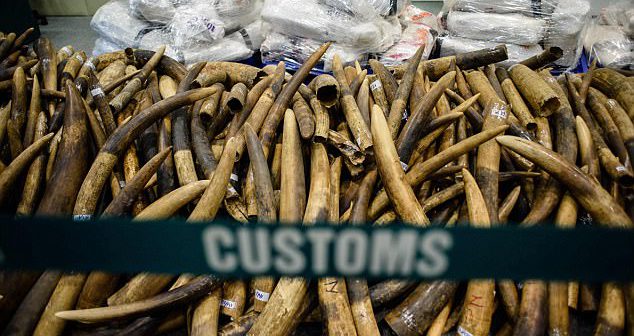 Seized elephant ivory tusks at the Kwai Chung Customhouse Cargo Examination Compound in Hong Kong earlier this month Read more: http://www.dailymail.co.uk/news/article ... z4mPeVQ98T Follow us: @MailOnline on Twitter | DailyMail on Facebook
Seized elephant ivory tusks at the Kwai Chung Customhouse Cargo Examination Compound in Hong Kong earlier this month Read more: http://www.dailymail.co.uk/news/article ... z4mPeVQ98T Follow us: @MailOnline on Twitter | DailyMail on Facebook
A major online retailer of ivory is to ban its sale, closing a major marketplace for the controversial trade.
Japanese website Rakuten said yesterday it was banning the sale of ivory on its site, shutting a major sales route in one of the world’s largest legal ivory markets. The company made the decision following mounting international criticism of the trade, a Rakuten spokesman said, with trading to be phased out over the next month
While China has pledged to shut down its domestic ivory trade by the end of this year, ivory imported before 1989 can be legally traded in Japan, with the government denying a link to illegal poaching.
Both the government and e-commerce sellers have been tightening monitoring of sellers, who are legally required to register their stock, amid criticism from wildlife groups that not enough is being done to prevent rule breaking.
Ivory trading continues on Yahoo Japan, the country’s biggest online auction site.
‘We don’t think that the legal ivory trade in Japan has any impact on African elephant numbers,’ said a Yahoo Japan spokesman.
‘It is important to recognise there are cultural differences between different countries,’ he added.
Elephant numbers fell 30 percent between 2007 and 2014, according to a census funded by Microsoft co-founder Paul Allen, with illegal poaching thought to be the primary reason for the decline.
The WWF says about 415,000 African elephants remain today, compared with the 3 million to 5 million in the early 20th century. The animal is listed as a vulnerable species by the International Union for Conservation of Nature.
Read more: http://www.dailymail.co.uk/news/article ... z4mPdW57rw
 Seized elephant ivory tusks at the Kwai Chung Customhouse Cargo Examination Compound in Hong Kong earlier this month Read more: http://www.dailymail.co.uk/news/article ... z4mPeVQ98T Follow us: @MailOnline on Twitter | DailyMail on Facebook
Seized elephant ivory tusks at the Kwai Chung Customhouse Cargo Examination Compound in Hong Kong earlier this month Read more: http://www.dailymail.co.uk/news/article ... z4mPeVQ98T Follow us: @MailOnline on Twitter | DailyMail on FacebookA major online retailer of ivory is to ban its sale, closing a major marketplace for the controversial trade.
Japanese website Rakuten said yesterday it was banning the sale of ivory on its site, shutting a major sales route in one of the world’s largest legal ivory markets. The company made the decision following mounting international criticism of the trade, a Rakuten spokesman said, with trading to be phased out over the next month
While China has pledged to shut down its domestic ivory trade by the end of this year, ivory imported before 1989 can be legally traded in Japan, with the government denying a link to illegal poaching.
Both the government and e-commerce sellers have been tightening monitoring of sellers, who are legally required to register their stock, amid criticism from wildlife groups that not enough is being done to prevent rule breaking.
Ivory trading continues on Yahoo Japan, the country’s biggest online auction site.
‘We don’t think that the legal ivory trade in Japan has any impact on African elephant numbers,’ said a Yahoo Japan spokesman.
‘It is important to recognise there are cultural differences between different countries,’ he added.
Elephant numbers fell 30 percent between 2007 and 2014, according to a census funded by Microsoft co-founder Paul Allen, with illegal poaching thought to be the primary reason for the decline.
The WWF says about 415,000 African elephants remain today, compared with the 3 million to 5 million in the early 20th century. The animal is listed as a vulnerable species by the International Union for Conservation of Nature.
Read more: http://www.dailymail.co.uk/news/article ... z4mPdW57rw
"Education is the most powerful weapon which you can use to change the world." Nelson Mandela
The desire for equality must never exceed the demands of knowledge
The desire for equality must never exceed the demands of knowledge
- Lisbeth
- Site Admin
- Posts: 65890
- Joined: Sat May 19, 2012 12:31 pm
- Country: Switzerland
- Location: Lugano
- Contact:
Re: Elephant Poaching & Ivory Trade
The economics of ivory is the economics of extinction
Written by Peter Knights, WildAid Co-Founder and CEO
Joseph Conrad, author of the classic novel, Heart of Darkness, once described the quest for ivory, slaves and rubber in colonial times as “the vilest scramble for loot that ever disfigured the history of human conscience”.
Decades later, as the scramble for ivory continued, the African elephant population halved in just ten years. Between 1979 and 1989, an estimated 600,000 were poached for their tusks, as Hong Kong ivory traders supplied the Japanese market. Having tried repeatedly and unsuccessfully to control the trade, in 1989 the UN Convention on International Trade in Endangered Species finally banned all international commercial ivory trade.
Another decade on, just as elephant populations were beginning to recover, Japan was permitted to purchase ivory at a so-called “one-off sale”. In 2008 a second, much larger, sale followed to Japanese and Chinese buyers, who paid an average of $157 per kilo for unworked ivory.
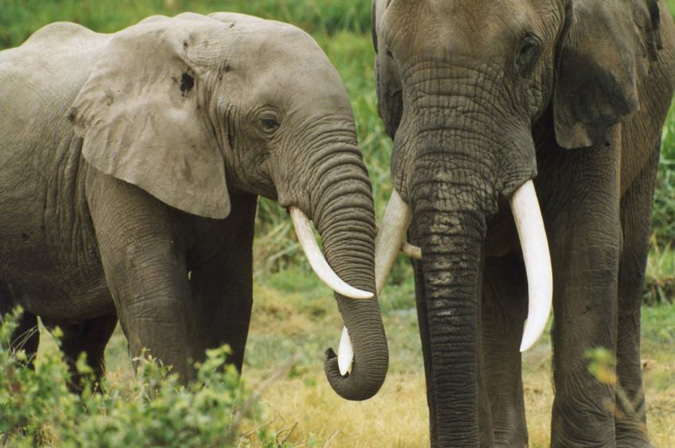
The opening of China’s ivory market in 2009 triggered a massive surge in demand. The country’s economy was growing rapidly, and by 2014 ivory, coveted as a symbol of wealth and status, was trading at $2,100 per kilo.
Traffickers and warlords, including the LRA’s Joseph Kony, were easily able to launder illegal ivory through the legal and lucrative market. Poaching soared across Africa. As many as 33,000 elephants were killed each year during 2010-2012. Tanzania alone lost as many as 60,000 elephants between 2009 and 2014, and Central African forest elephants declined by 65% between 2002 and 2014.
Images of industrial-scale elephant massacres shocked the world. Partnering with African Wildlife Foundation and Save the Elephants, and massively supported by Chinese state and private media, WildAid mounted the largest ever demand reduction campaign, leveraging tens of millions of dollars worth of TV ads, billboards and social media in China. Influential voices, such as those of Yao Ming, Lang Lang, Prince William, David Beckham, Sir Richard Branson and many more, appealed to consumers not to buy ivory.
In 2012, only a third of Chinese polled by WildAid knew that ivory might have come from poached elephants. Many believed that tusks simply fall out like baby teeth, or that they grow back after being cut off without harming the animals. By November 2016, 78% of Chinese who had previously bought ivory said they would not buy it again. Of these, 89% said that they had been convinced after learning that purchasing ivory can lead to the poaching of elephants. Support for a ban on the sale of ivory in China reached 95%.
As consumer attitudes changed, so did the policies of key governments. The U.S. and China jointly pledged to close their domestic ivory markets. China has begun a phased process of closing all carving factories and retail stores by the end of 2017. Hong Kong, too, is progressing an ivory trade ban bill, albeit at a much slower pace. Japan alone continues to allow almost unfettered domestic trade in ivory.
Since the announcement of China’s ban, prices have dropped sharply. A March 2017 Save the Elephants report found that the wholesale price of ivory tusks had fallen by 65% to $730 per kilogram on the mainland. Similarly, a WildAid investigation in Hong Kong revealed a 69% decline in wholesale prices there.
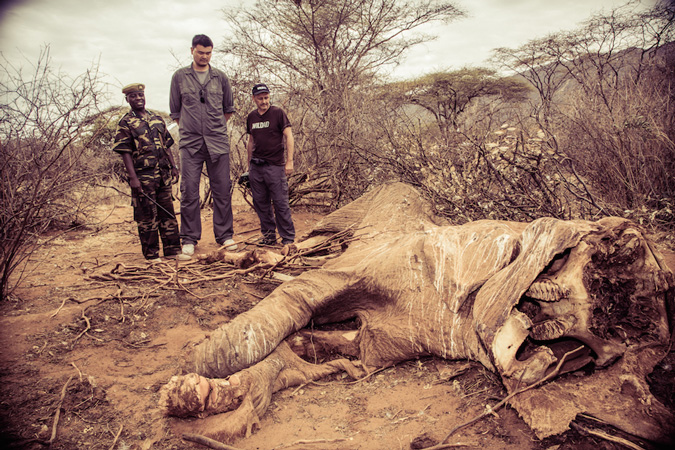 Yao Ming and WildAid’s Peter Knights visit a poaching site in “The End of the Wild”. ©WildAid
Yao Ming and WildAid’s Peter Knights visit a poaching site in “The End of the Wild”. ©WildAid
The combination of better elephant protection on the ground, stiffer penalties, improved law enforcement efforts, and reduced demand has made the illegal ivory trade riskier and less profitable. Although continent-wide figures on poaching have not yet been compiled, there have been reports that illegal killing may be slowing.
Last year Kenya experienced an 80% decline in poaching incidents compared to the peak of the crisis in 2012. Neighboring Tanzania, one of the hardest hit countries, has documented declines as well. Additionally, in 2016, seizures of ivory going into China fell by 80%, according to government figures, suggesting a reduction in smuggling.
Ultimately, as long as consumers are willing to buy ivory, whether the trade is legal or illegal, elephants will be killed to supply the demand. In places of weak governance and low economic development, illicit returns from poaching and trafficking will continue to outweigh the risks.
Until demand is negligible, elephants will remain vulnerable to poachers. Central Africa’s dwindling forest elephants are of particular concern, as well as those of Angola and Mozambique, where resources are strained and protection and monitoring is difficult.
We must stop the “heart of darkness” from beating – permanently. Human greed could never limit itself to ivory from natural elephant deaths, so Japan should join the rest of the world in banning the brutal ivory trade. Because only when the buying stops, the killing can, too.
The topic – the role that Asia has to play in furthering conservation efforts in Africa – was discussed at this year’s Conservation Lab, an invaluable workshop for African travel and conservation game-changers.
Written by Peter Knights, WildAid Co-Founder and CEO
Joseph Conrad, author of the classic novel, Heart of Darkness, once described the quest for ivory, slaves and rubber in colonial times as “the vilest scramble for loot that ever disfigured the history of human conscience”.
Decades later, as the scramble for ivory continued, the African elephant population halved in just ten years. Between 1979 and 1989, an estimated 600,000 were poached for their tusks, as Hong Kong ivory traders supplied the Japanese market. Having tried repeatedly and unsuccessfully to control the trade, in 1989 the UN Convention on International Trade in Endangered Species finally banned all international commercial ivory trade.
Another decade on, just as elephant populations were beginning to recover, Japan was permitted to purchase ivory at a so-called “one-off sale”. In 2008 a second, much larger, sale followed to Japanese and Chinese buyers, who paid an average of $157 per kilo for unworked ivory.

The opening of China’s ivory market in 2009 triggered a massive surge in demand. The country’s economy was growing rapidly, and by 2014 ivory, coveted as a symbol of wealth and status, was trading at $2,100 per kilo.
Traffickers and warlords, including the LRA’s Joseph Kony, were easily able to launder illegal ivory through the legal and lucrative market. Poaching soared across Africa. As many as 33,000 elephants were killed each year during 2010-2012. Tanzania alone lost as many as 60,000 elephants between 2009 and 2014, and Central African forest elephants declined by 65% between 2002 and 2014.
Images of industrial-scale elephant massacres shocked the world. Partnering with African Wildlife Foundation and Save the Elephants, and massively supported by Chinese state and private media, WildAid mounted the largest ever demand reduction campaign, leveraging tens of millions of dollars worth of TV ads, billboards and social media in China. Influential voices, such as those of Yao Ming, Lang Lang, Prince William, David Beckham, Sir Richard Branson and many more, appealed to consumers not to buy ivory.
In 2012, only a third of Chinese polled by WildAid knew that ivory might have come from poached elephants. Many believed that tusks simply fall out like baby teeth, or that they grow back after being cut off without harming the animals. By November 2016, 78% of Chinese who had previously bought ivory said they would not buy it again. Of these, 89% said that they had been convinced after learning that purchasing ivory can lead to the poaching of elephants. Support for a ban on the sale of ivory in China reached 95%.
As consumer attitudes changed, so did the policies of key governments. The U.S. and China jointly pledged to close their domestic ivory markets. China has begun a phased process of closing all carving factories and retail stores by the end of 2017. Hong Kong, too, is progressing an ivory trade ban bill, albeit at a much slower pace. Japan alone continues to allow almost unfettered domestic trade in ivory.
Since the announcement of China’s ban, prices have dropped sharply. A March 2017 Save the Elephants report found that the wholesale price of ivory tusks had fallen by 65% to $730 per kilogram on the mainland. Similarly, a WildAid investigation in Hong Kong revealed a 69% decline in wholesale prices there.
 Yao Ming and WildAid’s Peter Knights visit a poaching site in “The End of the Wild”. ©WildAid
Yao Ming and WildAid’s Peter Knights visit a poaching site in “The End of the Wild”. ©WildAidThe combination of better elephant protection on the ground, stiffer penalties, improved law enforcement efforts, and reduced demand has made the illegal ivory trade riskier and less profitable. Although continent-wide figures on poaching have not yet been compiled, there have been reports that illegal killing may be slowing.
Last year Kenya experienced an 80% decline in poaching incidents compared to the peak of the crisis in 2012. Neighboring Tanzania, one of the hardest hit countries, has documented declines as well. Additionally, in 2016, seizures of ivory going into China fell by 80%, according to government figures, suggesting a reduction in smuggling.
Ultimately, as long as consumers are willing to buy ivory, whether the trade is legal or illegal, elephants will be killed to supply the demand. In places of weak governance and low economic development, illicit returns from poaching and trafficking will continue to outweigh the risks.
Until demand is negligible, elephants will remain vulnerable to poachers. Central Africa’s dwindling forest elephants are of particular concern, as well as those of Angola and Mozambique, where resources are strained and protection and monitoring is difficult.
We must stop the “heart of darkness” from beating – permanently. Human greed could never limit itself to ivory from natural elephant deaths, so Japan should join the rest of the world in banning the brutal ivory trade. Because only when the buying stops, the killing can, too.
The topic – the role that Asia has to play in furthering conservation efforts in Africa – was discussed at this year’s Conservation Lab, an invaluable workshop for African travel and conservation game-changers.
"Education is the most powerful weapon which you can use to change the world." Nelson Mandela
The desire for equality must never exceed the demands of knowledge
The desire for equality must never exceed the demands of knowledge
- Flutterby
- Posts: 44029
- Joined: Sat May 19, 2012 12:28 pm
- Country: South Africa
- Location: Gauteng, South Africa
- Contact:
Hong Kong’s hippo teeth trade bigger, more harmful than realized
By Coconuts Hong Kong Aug. 28, 2017
Local university researchers have urged government authorities to step up the fight against the illegal trade in endangered species after discovering massive discrepancies in trade volumes of hippopotamus teeth being declared by importers and exporters.
The University of Hong Kong’s School of Biological Sciences study, published in the latest issue of the African Journal of Ecology, reveals that since 1975, Hong Kong, an infamous hub in the illegal ivory trade, has processed as much as 90 percent of the 770 tons of hippo teeth traded worldwide.
In just 19 transactions between Hong Kong and Uganda since the latter nation became a signatory to the Convention on International Trade in Endangered Species of Wild Fauna and Flora (CITES) in 1991, discrepancies in the declared trade volumes amount to more than 14,000 kilograms of hippo teeth. For perspective, that figure, if correct, would amount to some 2,700 individual hippos killed, or roughly 2% of the global population.
Export numbers from Tanzania were similarly found to be fudged downward since 1980, with an estimated 3,176 kilograms more teeth exported than the African nation admitted.
Hippos have been listed by the International Union for Conservation of Nature as vulnerable since 2006, meaning the species could be extinct within a century if numbers continued to fall at current rates.
Hippo teeth are often sold as an alternative to ivory, and used to make various goods and sculptures. They are also used as a component of traditional medicine in some Asian countries.
While CITES has been enforced in a bid to regulate wild animal trade since 1975, the number of hippopotamus has continued to plunge. In the past 30 years, the figure has dropped by 30 percent.
Alexandra Andersson, head researcher for the new study, said authorities should move to stop the international trade in threatened species before they are exposed to unmanageable exploitation levels that could ultimately lead to extinction, SCMP reports.
https://coconuts.co/hongkong/news/resea ... hong-kong/
Local university researchers have urged government authorities to step up the fight against the illegal trade in endangered species after discovering massive discrepancies in trade volumes of hippopotamus teeth being declared by importers and exporters.
The University of Hong Kong’s School of Biological Sciences study, published in the latest issue of the African Journal of Ecology, reveals that since 1975, Hong Kong, an infamous hub in the illegal ivory trade, has processed as much as 90 percent of the 770 tons of hippo teeth traded worldwide.
In just 19 transactions between Hong Kong and Uganda since the latter nation became a signatory to the Convention on International Trade in Endangered Species of Wild Fauna and Flora (CITES) in 1991, discrepancies in the declared trade volumes amount to more than 14,000 kilograms of hippo teeth. For perspective, that figure, if correct, would amount to some 2,700 individual hippos killed, or roughly 2% of the global population.
Export numbers from Tanzania were similarly found to be fudged downward since 1980, with an estimated 3,176 kilograms more teeth exported than the African nation admitted.
Hippos have been listed by the International Union for Conservation of Nature as vulnerable since 2006, meaning the species could be extinct within a century if numbers continued to fall at current rates.
Hippo teeth are often sold as an alternative to ivory, and used to make various goods and sculptures. They are also used as a component of traditional medicine in some Asian countries.
While CITES has been enforced in a bid to regulate wild animal trade since 1975, the number of hippopotamus has continued to plunge. In the past 30 years, the figure has dropped by 30 percent.
Alexandra Andersson, head researcher for the new study, said authorities should move to stop the international trade in threatened species before they are exposed to unmanageable exploitation levels that could ultimately lead to extinction, SCMP reports.
https://coconuts.co/hongkong/news/resea ... hong-kong/
- Lisbeth
- Site Admin
- Posts: 65890
- Joined: Sat May 19, 2012 12:31 pm
- Country: Switzerland
- Location: Lugano
- Contact:
Re: Hong Kong’s hippo teeth trade bigger, more harmful than realized
It is not possible..........or is it 


"Education is the most powerful weapon which you can use to change the world." Nelson Mandela
The desire for equality must never exceed the demands of knowledge
The desire for equality must never exceed the demands of knowledge
- Richprins
- Committee Member
- Posts: 75367
- Joined: Sat May 19, 2012 3:52 pm
- Location: NELSPRUIT
- Contact:
Re: Hong Kong’s hippo teeth trade bigger, more harmful than realized
Hippo teeth are often sold as an alternative to ivory,
Ja, more like they are sold as fake ivory. Been going on a loong time, as the article says. So by implication the "traditional uses" there would assume it is ivory. The East Asians don't know a hippo from a bar of soap.
Ja, more like they are sold as fake ivory. Been going on a loong time, as the article says. So by implication the "traditional uses" there would assume it is ivory. The East Asians don't know a hippo from a bar of soap.
Please check Needs Attention pre-booking: https://africawild-forum.com/viewtopic.php?f=322&t=596
- Lisbeth
- Site Admin
- Posts: 65890
- Joined: Sat May 19, 2012 12:31 pm
- Country: Switzerland
- Location: Lugano
- Contact:
Re: Hong Kong’s hippo teeth trade bigger, more harmful than realized
Some of them, obviously 
"Education is the most powerful weapon which you can use to change the world." Nelson Mandela
The desire for equality must never exceed the demands of knowledge
The desire for equality must never exceed the demands of knowledge
- Lisbeth
- Site Admin
- Posts: 65890
- Joined: Sat May 19, 2012 12:31 pm
- Country: Switzerland
- Location: Lugano
- Contact:
Re: Elephant Poaching & Ivory Trade
China ivory ban bites online
BY LIU XIN - 31 DECEMBER 2017 - GLOBAL TIMES
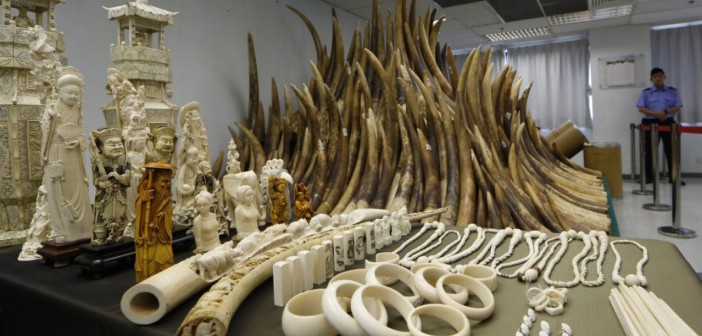
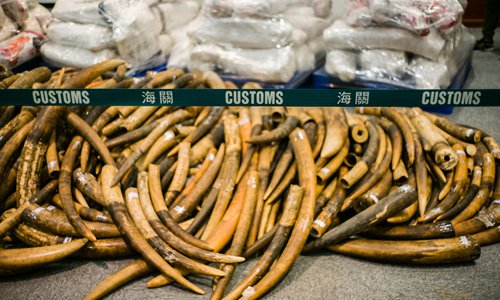
Seized elephant ivory tusks are seen behind a customs cordon during a press conference at the Kwai Chung Customhouse Cargo Examination Compound in Hong Kong on July 6, 2017. Hong Kong Customs have seized 7.2 tonnes of ivory tusks with an estimated market value of HKD 72 million (9.2 million usd) in the city’s largest bust in three decades. PHOTO: AFP
China began to ban sales of ivory and ivory products from Sunday in a move that Chinese internet users hailed on social media with the slogan “no sales, no killings.”
“Starting Sunday, it will be unlawful for any market or shops to sell ivory or ivory products,” China’s forestry administration announced on its microblog on Sunday. “It will be considered unlawful to sell these products online. And it will also be unlawful to bring these products from abroad.”
A webpage with the Chinese language hashtag “make ivory products commercial no more” was viewed more than 146,000 times as of press time on Sunday.
Many non-government organizations reposted the hashtag and released videos calling for an ivory trade ban.
Many China’s Net users wrote under the hashtag, “This is the right thing to do. And no sale, no killing.”
In a search of “ivory” on China’s domestic search engine Baidu, a notice pops up saying, “buying equals killing, please say ‘no’ to ivory products” at the top of the results, a Global Times reporter found on Sunday.
Online commercial platforms including tmall.com returned no results on ivory products on their product searches.
However, some shops at an antique market in Beijing still sell ivory products on Sunday, and a shop assistant told the Global Times that the ivory products they sell were made of mammoth, not elephant.
“We are told that selling ivory products from elephants is illegal, but that it is OK to sell the tusks of long-dead woolly mammoths,” the shop assistant said.
A pendant made from mammoths displayed at the shop is being sold for 49,600 yuan ($7,623).
A shop assistant at another shop told the Global Times that they could not sell ivory products online and it is risky to display these products in their shop.
A necklace displayed at the shop sells for 3,600 yuan.
The comprehensive ban would affect “34 processing enterprises and 143 designated trading venues,” the Xinhua News Agency reported Friday.
“This will shut down the world’s largest market for elephant ivory,” Aili Kang, executive director of the Wildlife Conservation Society in Asia, said in a statement, the Guardian reported.
Read original article: http://www.globaltimes.cn/content/1082799.shtml
BY LIU XIN - 31 DECEMBER 2017 - GLOBAL TIMES


Seized elephant ivory tusks are seen behind a customs cordon during a press conference at the Kwai Chung Customhouse Cargo Examination Compound in Hong Kong on July 6, 2017. Hong Kong Customs have seized 7.2 tonnes of ivory tusks with an estimated market value of HKD 72 million (9.2 million usd) in the city’s largest bust in three decades. PHOTO: AFP
China began to ban sales of ivory and ivory products from Sunday in a move that Chinese internet users hailed on social media with the slogan “no sales, no killings.”
“Starting Sunday, it will be unlawful for any market or shops to sell ivory or ivory products,” China’s forestry administration announced on its microblog on Sunday. “It will be considered unlawful to sell these products online. And it will also be unlawful to bring these products from abroad.”
A webpage with the Chinese language hashtag “make ivory products commercial no more” was viewed more than 146,000 times as of press time on Sunday.
Many non-government organizations reposted the hashtag and released videos calling for an ivory trade ban.
Many China’s Net users wrote under the hashtag, “This is the right thing to do. And no sale, no killing.”
In a search of “ivory” on China’s domestic search engine Baidu, a notice pops up saying, “buying equals killing, please say ‘no’ to ivory products” at the top of the results, a Global Times reporter found on Sunday.
Online commercial platforms including tmall.com returned no results on ivory products on their product searches.
However, some shops at an antique market in Beijing still sell ivory products on Sunday, and a shop assistant told the Global Times that the ivory products they sell were made of mammoth, not elephant.
“We are told that selling ivory products from elephants is illegal, but that it is OK to sell the tusks of long-dead woolly mammoths,” the shop assistant said.
A pendant made from mammoths displayed at the shop is being sold for 49,600 yuan ($7,623).
A shop assistant at another shop told the Global Times that they could not sell ivory products online and it is risky to display these products in their shop.
A necklace displayed at the shop sells for 3,600 yuan.
The comprehensive ban would affect “34 processing enterprises and 143 designated trading venues,” the Xinhua News Agency reported Friday.
“This will shut down the world’s largest market for elephant ivory,” Aili Kang, executive director of the Wildlife Conservation Society in Asia, said in a statement, the Guardian reported.
Read original article: http://www.globaltimes.cn/content/1082799.shtml
"Education is the most powerful weapon which you can use to change the world." Nelson Mandela
The desire for equality must never exceed the demands of knowledge
The desire for equality must never exceed the demands of knowledge


